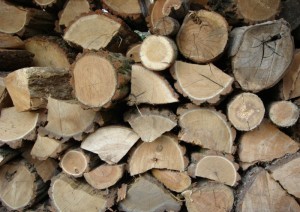Staying warm this winter requires the proper preparation. For maintaining a comfortable temperature inside the home, this could involve starting a fire in the wood burning stove or fireplace. To ensure the hottest, most fuel efficient fire, you have to start off with the best firewood.
The most critical trait to consider in your firewood is the extent of its seasoning. To be seasoned is to have been allowed to dry fully by being stored indoors for a specific amount of time. Essentially, seasoned wood means dry wood. How long the wood needs to completely season varies based on the type of wood. Softer varieties of wood may season in six month, while hardwoods can require as long as two years to achieve completer dryness.
Preferably, any wood you burn should have been allowed to season completely prior to burning. To follow this guideline, you have two options. First, you can purchase wood that is already fully seasoned. This wood can be burned right away for the best fuel efficiency, but you may have a hard time finding it. If you do find well seasoned wood for sale, it probably costs significantly more than the wet wood. The other option is to purchase wet wood and allow it to season in a shed or garage. This option saves you upfront costs, but it involves planning one or two years in advance. Either option you choose, you should always burn seasoned wood. A lot of energy is wasted on wet wood by boiling away the trapped moisture, so you end up with a colder fire, excess smoke, more spent on fuel, and incompletely burnt wood.
Incompletely burnt wood creates health risks because it produces a black, tarry material called creosote. Initially a vapor as it exits the fire, creosote condenses inside the chimney. Over time the creosote can build up and restrict the air flow through the chimney, which can lead to poor indoor air quality. The high flammability of creosote can also result in a chimney fire from a mere stray ember. Luckily, avoiding this risk is as easy as burning seasoned wood and having an annual chimney sweep and inspection done.
Just because you purchase seasoned wood does not mean it stays seasoned forever. How you store the wood after you buy it and before you burn it determines whether or not it remains fully seasoned. The ideal storage arrangement involves stacking the wood, with a depth of only one log, in a shed or other outdoor building. Leave the wood uncovered to prevent condensation. If the wood must sit outside, protect it from the elements by creating a sturdy roof for it. A piece of sheet metal works well. Be sure to leave the sides of the stack uncovered to encourage air flow.
If you have any questions about firewood or if you need to schedule a chimney sweep or inspection, contact Billy Sweet Chimney Sweep to speak with an expert.

